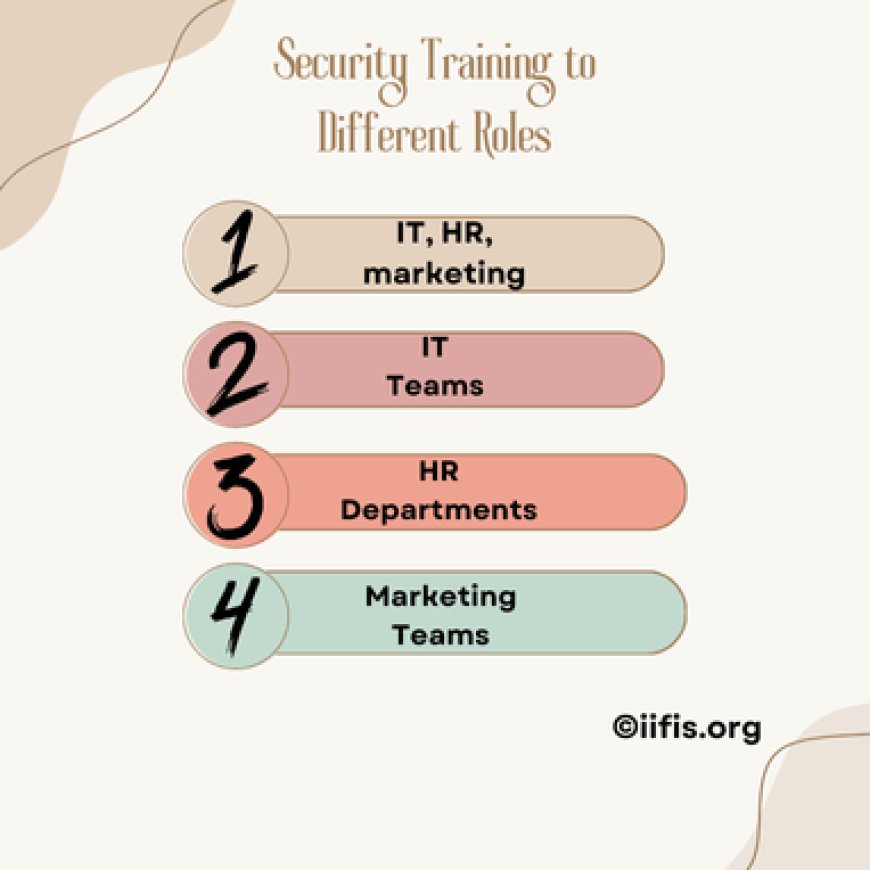Why Security Training is Essential Today
Discover why security training is crucial in today's digital landscape. Learn how comprehensive training helps prevent cyberattacks, protects sensitive data, and fosters a security-first mindset within your organization.

In an increasingly interconnected world, the importance of robust security measures has never been greater. With cyber threats evolving daily and data breaches becoming more frequent, businesses and individuals alike are at risk of significant financial and reputational damage. This is where Security Training becomes essential. Whether you are a professional protecting sensitive information or an organization protecting your digital infrastructure, staying informed and vigilant is critical. In this blog, we'll explore why security training is not just a precaution but a necessity in today’s digital age, and how it can help prevent costly security breaches while fostering a safer online environment.
Rising Cybersecurity Threats
-
Statistics on the Rise of Cyberattacks
-
Cyberattacks are on the rise, with global incidents increasing significantly in recent years. For example, phishing attacks surged by 600% in 2020, while ransomware attacks grew by over 150% in 2021. Additionally, the average cost of a data breach rose to $4.45 million in 2023, according to industry reports.
-
How Remote Work and Digital Transformation Expanded the Attack Surface
-
The shift to remote work and widespread digital transformation have significantly increased the vulnerability of organizations. More devices, remote networks, and cloud services have created a larger attack surface for cybercriminals to exploit, particularly through unsecured home networks and poorly protected systems.
-
Real-Life Examples of Recent High-Profile Security Incidents
-
The Colonial Pipeline ransomware attack in 2021 disrupted fuel supply across the U.S., causing widespread panic. Similarly, in 2022, T-Mobile faced a major data breach that exposed the personal information of 37 million customers. These incidents highlight the growing sophistication and frequency of cyberattacks, underscoring the urgent need for stronger cybersecurity measures.
Importance of the Human Factor in Cybersecurity
-
Employees as the Weakest Link in Security
-
Employees are often the weakest link in an organization’s cybersecurity defenses, with phishing attacks being a prime example. Cybercriminals exploit human vulnerability by tricking employees into clicking malicious links, downloading malware, or revealing sensitive information. According to reports, over 90% of cyberattacks begin with a phishing email, demonstrating how easily human errors can compromise security.
-
User Error in Causing Data Breaches and Vulnerabilities
-
User errors, such as weak passwords, misconfigured systems, or accidental sharing of confidential data, are major contributors to data violations . A simple mistake, like sending sensitive information to the wrong recipient or failing to update software, can create significant security vulnerabilities, opening the door for cybercriminals to exploit.
-
Why Security Training for Employees is Crucial
-
To mitigate these risks, security training for employees is essential. Regular training sessions help employees recognize threats, such as phishing emails or suspicious activity, and promote best practices like strong password management, secure browsing, and reporting suspicious incidents. This builds a security-conscious culture and equips employees with the knowledge to be a proactive defense rather than a liability.
Key Components of Effective Security Training
-
Overview of Essential Security Topics
-
Phishing Detection: Training employees to identify phishing attempts, such as suspicious emails or links, and teaching them to verify the sender before interacting.
-
Password Management: Educating on the use of strong, unique passwords and encouraging the use of password managers to reduce weak passwords and credential reuse.
-
Data Protection: Emphasizing the importance of protecting sensitive data, including encryption practices, secure file sharing, and safeguarding personal and company information.
-
Safe Browsing: Teaching best practices for secure browsing, such as avoiding suspicious websites, recognizing potential malware risks, and using secure Wi-Fi connections.
-
Importance of Regular Updates and Refreshers on Emerging Threats
-
Cyber threats evolve rapidly, so it’s essential to provide regular updates on emerging threats like ransomware, social engineering, and new phishing tactics. Ongoing training ensures that employees stay aware of the latest threats and security best practices.
-
Hands-On Exercises and Simulations for Real-World Scenarios
-
Incorporating hands-on exercises and simulations into the training helps employees experience real-world cybersecurity scenarios, such as mock phishing attacks or incident response drills. These exercises build practical skills and prepare employees to respond quickly and effectively to potential security incidents.
Legal and Compliance Requirements in Cybersecurity
-
Industry Regulations
-
Many industries are subject to strict data protection regulations like the GDPR (General Data Protection Regulation) in Europe, HIPAA (Health Insurance Portability and Accountability Act) in healthcare, and PCI DSS (Payment Card Industry Data Security Standard) for businesses handling credit card information. These regulations mandate stringent security measures to protect sensitive data. Security training plays a vital role in ensuring that employees understand these regulations and adhere to required protocols, helping businesses stay compliant with industry standards.
-
Consequences of Non-Compliance
-
Failure to comply with legal regulations can result in severe penalties:
-
Fines: Non-compliance with laws like GDPR can lead to heavy fines—up to €20 million or 4% of annual global turnover, whichever is higher.
-
Lawsuits: Data breaches due to non-compliance can result in class-action lawsuits, especially if customer data is compromised.
-
Reputational Damage: Businesses that fail to protect customer data suffer significant reputational harm, losing trust and credibility with clients and partners.
Benefits of Security Training
-
Reduces the Risk of Breaches, Saves Costs, and Protects Company Assets
-
Comprehensive security training equips employees to identify and mitigate cyber threats, significantly reducing the risk of breaches. By preventing potential attacks, companies avoid the high costs associated with data breaches, including recovery expenses, legal fees, and reputational damage. Training helps protect valuable company assets, including sensitive customer data and intellectual property, from falling into the wrong hands.
-
Increases Employee Awareness and Responsibility for Safeguarding Data
-
Security training fosters a higher level of awareness among employees regarding potential threats like phishing and malware. It also instills a sense of responsibility for safeguarding data, ensuring that all team members understand their role in protecting sensitive information and adhering to security protocols.
-
Improves Overall Company Culture with a Security-First Mindset
-
A well-executed training program helps build a security-first mindset across the organization, improving overall company culture. Employees are more likely to make security-conscious decisions, adopt best practices, and actively contribute to maintaining a safe digital environment, creating a proactive, resilient workplace where security is prioritized at every level.
Tailoring Security Training to Different Roles

-
Customized Training for Different Departments
IT, HR, marketing, and other departments face distinct security challenges and handle different types of data, which requires customized training. For example:
-
-
-
IT Teams: Need advanced training in network security, system vulnerabilities, and incident response, as they manage infrastructure and are on the front lines of defense.
-
HR Departments: Handle sensitive employee data, so they must focus on data protection, compliance with privacy regulations like GDPR, and securing personal information.
-
Marketing Teams: Often have access to customer data and use third-party platforms, so training should emphasize secure use of digital tools, safe sharing of data, and recognizing phishing schemes aimed at external communications.
-
-
-
Role-Specific Training Based on Access to Sensitive Information
-
Employees should receive role-specific training depending on their level of access to sensitive information:
-
Executives and Management: Require training on securing high-level confidential data and best practices for sharing information across departments or with external partners.
-
Customer Support Teams: Need to understand data privacy and secure handling of customer information during interactions to prevent leaks or breaches.
-
General Staff: Basic cybersecurity training on recognizing phishing, secure password management, and safe internet use is essential for everyone but can be tailored to each role's needs.
-
-
security training is no longer optional—it’s essential. With cyberattacks becoming more sophisticated and frequent, the human element remains one of the most vulnerable points in any organization’s defense. Tailored security training equips employees with the knowledge and skills to identify threats, protect sensitive data, and follow best practices.
Businesses must invest in regular, comprehensive security training to safeguard their operations and data. Institutions like IIFIS (International Institute of Financial Industry Security) offer top-tier training programs to help companies stay ahead of potential threats. By making security training a priority, businesses can build a more resilient, secure environment and mitigate the risks of costly breaches and data losses.
























